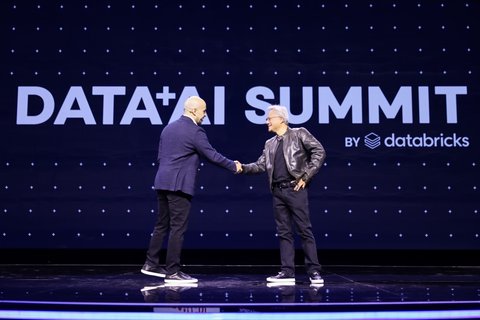Databricks Data & AI Summit 2024: A New Era of Openness and Security
June 15, 2024 in Data Platforms4 minutes

The 2024 Summit highlighted Databricks' leadership in data and AI, emphasizing security, open-source contributions, and strategic partnerships to advance the field.
The Databricks Data & AI Summit 2024, held in San Francisco, gathered over 16,000 attendees in person and 60,000 virtually. The event was a melting pot of innovation, collaboration, and industry-leading announcements. Here is a comprehensive summary of the key highlights and releases from the summit, showcasing advancements in data engineering, machine learning, and artificial intelligence.
📚 Open-Sourcing Unity Catalog
A landmark announcement at the summit was the decision to open-source Unity Catalog. Initially launched in 2021 to enhance data governance with greater discoverability, Unity Catalog’s transition to open source is poised to drive collaboration and innovation. This will enable a unified governance solution across various compute engines and data formats such as Delta Lake, Apache Iceberg™, and Apache Hudi™.
🌊 Introduction of Databricks LakeFlow
Databricks released LakeFlow, a new solution designed to unify data engineering processes. It offers comprehensive tools for ingestion, transformation, and orchestration, managed on serverless compute resources. LakeFlow aims to streamline data workflows, ensuring higher quality and more timely data delivery for businesses.
🧠 Enhancements to Mosaic AI
Major updates to Mosaic AI were highlighted, introducing a suite of capabilities supporting AI system deployment and governance. These include:
- Mosaic AI Model Training: A zero-code solution for fine-tuning models with private data.
- Mosaic AI Agent Framework: Tools for creating retrieval-augmented generation (RAG) applications.
- Mosaic AI Agent Evaluation and Gateway: Tools for measuring AI outputs and managing LLM availability.
These advancements ensure more effective and innovative AI utilization for businesses.
🤖 Major Advancements in MLflow
Significant updates to MLflow focused on generative AI (GenAI) and large language models (LLMs), covering the entire machine learning lifecycle from model training to deployment and monitoring. These enhancements are designed to foster better team collaboration and improve AI model operationalization.
📊 Launch of Databricks AI/BI
Databricks introduced AI/BI, aimed at democratizing data analysis through intelligent analytics. The platform features AI-powered dashboards and Genie, a conversational interface allowing users to query data naturally and interact more intuitively with their datasets, democratizing data analytics across organizational levels.
🤝 Nvidia Partnership
Nvidia CEO Jensen Huang announced an expanded partnership with Databricks to accelerate enterprise data analytics and AI. This collaboration leverages Nvidia’s powerful hardware capabilities alongside Databricks’ software solutions, promising groundbreaking AI developments.
☁️ Serverless Compute General Availability
Serverless computing, previously in public preview, is now generally available. This model allows automatic resource scaling, cost-efficient usage, and eliminates versioning challenges. Databricks encourages users to adopt serverless computing for its foundational efficiencies moving forward.
🖼 Shutterstock ImageAI Launch
Shutterstock ImageAI, utilizing Databricks’ AI technology, was introduced to revolutionize visual content management. This tool offers advanced image analysis, seamlessly integrating into workflows to enhance various business processes.
📈 Data Quality Processor for Databricks
Alation unveiled a Data Quality Processor for Databricks, integrating deeper to improve data health visibility across enterprises. This processor leverages Databricks Lakehouse Monitoring, ensuring accessible and actionable data quality metrics, enhancing data trust and reliability.
🔒 Advanced AI/BI Governance Solutions
Databricks introduced enhanced tools for AI governance, including Databricks Lakehouse Monitoring, which features automated profiling and anomaly detection to maintain high data quality standards.
🔄 Expansion of Data Sharing with Delta Sharing
Delta Sharing D20 was highlighted as an open solution enhancing secure, live data sharing from Databricks lakehouses to any computing platform. This initiative aims to foster broader collaboration and data accessibility, maintaining security.
🛠 Frameworks for Compound AI Systems
Databricks announced comprehensive toolkits and workflows to support compound AI system development and deployment. These frameworks enable seamless creation of sophisticated AI applications, promoting operational efficiency and innovation.
🌍 Commitment to Data Democratization
CEO Ali Ghodsi reaffirmed Databricks’ mission to democratize data and AI, emphasizing the need for unified governance, open standards, and comprehensive AI tools. Databricks is committed to driving forward the accessibility and usability of data technologies.
🤝 Vision for Interoperability and Innovation
The acquisition of Tabular reinforces Databricks’ stance on interoperability. Integrating Apache Iceberg with Delta Lake systems aims to eliminate platform fragmentation, giving users greater control over their data ecosystem.
🔐 Emphasis on Data Security and Privacy
The summit emphasized securing data environments amid increasing AI-related regulations and cyber threats. New governance tools offer robust security while maintaining accessibility and performance.
Conclusion
The Databricks Data & AI Summit 2024 underscored the company’s leadership in the data and AI space. By opening its core tools and frameworks to the wider community, fostering strategic partnerships, and continuously enhancing its platforms, Databricks is setting the stage for the next wave of innovation in data science. The summit highlighted the significant potential for businesses to harness their data and AI capabilities effectively.